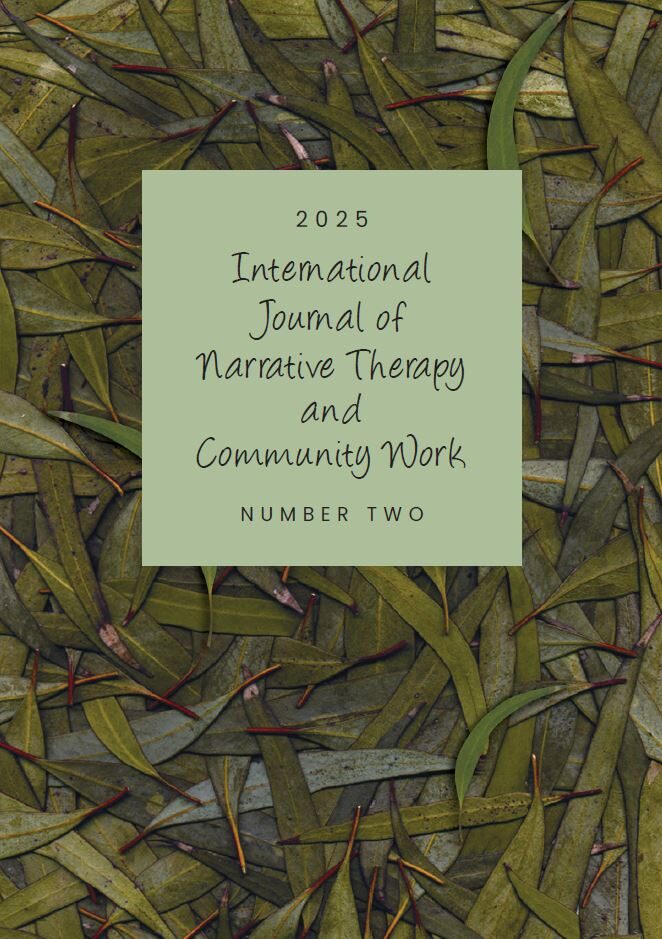International Journal of Narrative Therapy and Community Work
2025 Issue two

Dear Reader,
Too many people are up against horrifying injustices that are being perpetuated in an attempt to diminish their lives. Within these same contexts, there are stories of resistance, of people holding on to what is precious to them, of speaking up. Reminding us, yet again, that our work is situated in history, culture and politics. This edition is a testimony to the expansive possibilities of narrative practice and the ethics of solidarity.
Scroll down for the interactive issue ↓

Peer-Reviewed Papers

Exploring narrative therapy and therapeutic letter writing in a genetic counselling context — Stephanie Badman
This paper explores using narrative therapy in a genetic counselling context to support people having predictive genetic testing for neurogenetic conditions. Using case examples, I

“Love always”: Letters written by dying mothers for their children — Tanya Newman
This article shares stories of dying mothers writing letters for their children. The author conceives of letter writing as a way for mothers to re-member

From isolation to connection: Young people, narrative practice and canine care — Jack Chiu and Sharon Leung
This paper presents a project combining narrative practices and human–canine interaction to support young people in Hong Kong who were socially withdrawn and not in

Psychedelic-assisted therapy from a narrative therapy perspective: A map for practitioners — Christine Dennstedt
Psychedelic-assisted therapy is currently in its second wave and enjoying a renaissance of sorts. This article describes a narrative therapy–inspired approach to working therapeutically with

Solidarity conversations: A feminist narrative lens on bulimia and abuse – Kassandra Pedersen
Literature often frames bulimia through biomedical models of disease, emphasising biological, psychological and behavioural deficits, and treatments focused on symptom reduction. This paper reimagines so-called

“Pockets of freedom”: Creating therapeutic spaces as refuges for Black experiences of neurodivergence – Sandra Coral
The influence of Eurocentricism on therapy spaces makes them unsafe for Black people. This is compounded for Black people whose lives are impacted by their

Children’s problems and children’s solutions: Celebrating the agency of neurodivergent children – Tarang Kaur
Children, particularly those on the neurodivergence spectrum, have historically not been afforded a great degree of power and voice in their own lives. This has
Reviews

The Friendship Bench: How fourteen grandmothers inspired a mental health revolution by Dixon Chibanda
A review of Dixon Chibanda’s (2025) book The Friendship Bench: How fourteen grandmothers inspired a mental health revolution.

Radiance in Pain and Resilience: The global reverberation of Palestinian historical trauma by Samah Jabr
We all become witnesses: A review of Samah Jabr’s (2025) book Radiance in Pain and Resilience: The global reverberation of Palestinian historical trauma

How Fascism Works: The politics of us and them by Jason Stanley
A review of Jason Stanley’s (2020) book How Fascism Works: The politics of us and them
Video

We have always been here, we’ve been here before: Responding to ongoing anti-trans fascism and colonisation with history, storytelling, and connection to land and community – Lorraine Grieves
This video contribution highlights the importance of active response and continued resistance – not reaction – to the rise in transmisogyny, anti-trans and racist hate.
Audio

Wisdom on living with loneliness – Chelsea Size
This audio practice note describes the generation of a collective document of insider knowledges about living with loneliness with older people living in Eldercare residential

Telling our stories in ways that make us stronger by Aunty Barbara Wingard, read by Jean McMahon
This is an audio recording of a paper that was originally delivered as the opening keynote address at the first International Narrative Therapy and Community
If you would prefer to read a printed version of International Journal of Narrative Therapy and Community Work, each issue is available for purchase from Amazon, Barnes & Noble, or through your local bookstore.
The views expressed in this journal are not necessarily those of the publisher.